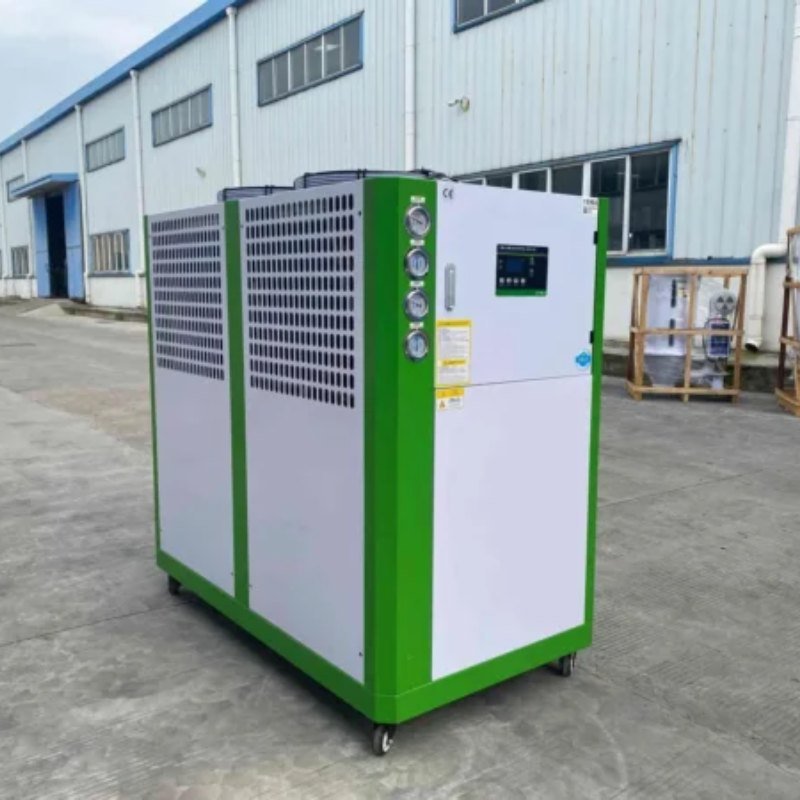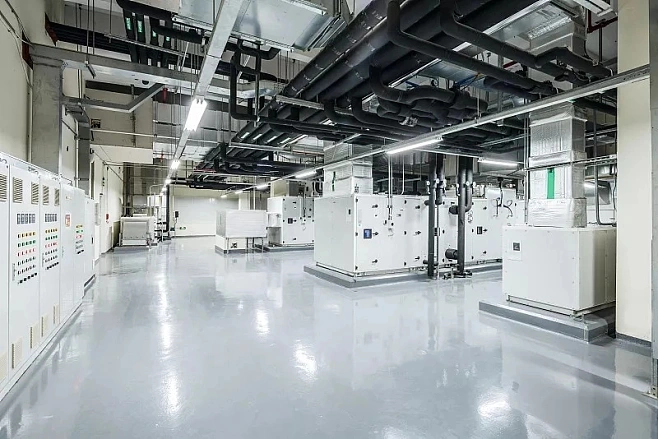Чиллеры с воздушным охлаждением очень важны в современном промышленном и коммерческом мире, поскольку они обеспечивают охлаждение большого количества оборудования, тем самым стабилизируя и обеспечивая эффективный производственный процесс. Поэтому пользователям приходится пристально вглядываться в длинный список чиллеров с воздушным охлаждением: Сколько существует типов чиллеров с воздушным охлаждением? Об этом и пойдет речь в данной статье, где будут рассмотрены различные типы охладителей с воздушным охлаждением и сценарии их применения.
I. Основные принципы работы чиллеров с воздушным охлаждением

Прежде чем перейти к рассмотрению различных типов, необходимо знать основные принципы работы промышленных чиллеров с воздушным охлаждением. В целом, промышленные чиллеры с воздушным охлаждением втягивают наружный воздух через вентилятор для охлаждения хладагента, позволяя воздуху охлаждать хладагент. При таком способе охлаждения не используется градирня или система охлажденной воды, поэтому он менее сложен в установке и обслуживании.
II. Основная классификация чиллеров с воздушным охлаждением
Чиллеры с воздушным охлаждением можно разделить на различные типы в зависимости от их технических характеристик и требований к применению. Ниже приведены некоторые распространенные классификации:
1. Тип компрессора
Тип компрессора напрямую влияет на производительность и энергоэффективность промышленного чиллера с воздушным охлаждением. На рынке представлены следующие распространенные типы компрессоров:
(1). Винтовые охладители
Винтовые чиллеры, известные своей высокой холодопроизводительностью и эффективностью, часто используются в средних и крупных холодильных установках. Стабильная работа и высокая энергоэффективность делают их лучшим выбором для химической, фармацевтической и пищевой промышленности. Винтовые чиллеры всегда надежны и долговечны, поэтому промышленные пользователи отдают им предпочтение.
(2). Спиральные охладители
Спиральные компрессоры компактны и бесшумны, что делает их подходящими для применения в небольших и средних помещениях. Они отлично подходят для коммерческого охлаждения и небольших промышленных процессов, таких как офисы, розничные магазины и небольшие заводы. Спиральные чиллеры предпочитают за их высокую эффективность, низкий уровень шума и надежность.
(3). Центробежные охладители
Центробежные чиллеры - это высокоэффективное холодильное оборудование, широко используемое в промышленных и коммерческих целях. Их основной компонент - центробежный компрессор, который сжимает хладагент через высокоскоростную вращающуюся крыльчатку, завершая тем самым холодильный цикл. Они высокоэффективны и энергосберегающи, особенно в крупных холодильных системах, что значительно снижает затраты на электроэнергию. Кроме того, плавная работа, компактный дизайн и низкий уровень шума делают их пригодными для использования в экологически чувствительных средах.
2. Разнообразные сценарии применения
Спрос на чиллеры в разных отраслях промышленности существенно различается, что привело к появлению множества специализированных моделей:
(1). Промышленные чиллеры с воздушным охлаждением

Промышленные чиллеры с воздушным охлаждением применяются при высоких нагрузках и используются в производственных линиях заводов, при переработке пластмасс и пищевых продуктов. Они могут поддерживать безостановочный и очень тяжелый промышленный процесс. При достижении стабильного производства достигается и эффективность.
(2). Коммерческие промышленные чиллеры с воздушным охлаждением
Коммерческие чиллеры с воздушным охлаждением применяются для центрального кондиционирования воздуха в торговых центрах, гостиницах, офисных зданиях и т.д. Именно охлаждение делает пребывание в коммерческом здании приятным.
(3). Портативные промышленные чиллеры с воздушным охлаждением
Портативные промышленные чиллеры с воздушным охлаждением предназначены для временного или дополнительного охлаждения. Таким образом, устройство обычно имеет небольшие размеры, легко перемещается и просто устанавливается в местах, где необходимо быстро обеспечить охлаждение, например, на строительных площадках, при проведении мероприятий и даже в небольших лабораториях.
3. Мощность охлаждения
(1). Небольшие чиллеры (<50 кВт)
Малые чиллеры подходят для охлаждения небольшого оборудования, например, небольшого лабораторного оборудования, или для домашнего использования. Средние чиллеры (50-500 кВт)
Средние чиллеры обычно используются в коммерческих зданиях и на малых и средних предприятиях, удовлетворяя средние потребности в охлаждении.
(2). Крупногабаритные чиллеры (>500 кВт)
Крупногабаритные чиллеры используются в основном на крупных промышленных объектах и в центрах обработки данных, обеспечивая мощную холодопроизводительность для удовлетворения масштабных потребностей в охлаждении.
III. Технические преимущества и проблемы чиллеров с воздушным охлаждением
1. Анализ преимуществ
Чиллеры с воздушным охлаждением обладают следующими существенными преимуществами по сравнению с охладителями с водяным охлаждением:
Не требуется охлаждающая башня: Это упрощает установку и обслуживание, снижает затраты на водоподготовку и делает эксплуатацию более рентабельной.
Водосберегающий и экологически чистый: Промышленные чиллеры с воздушным охлаждением не зависят от водных ресурсов, подходят для засушливых регионов или мест с высокими требованиями к сохранению водных ресурсов, помогая предприятиям реализовать свои цели в области устойчивого развития.
Модульная конструкция: Многие производители чиллеров с воздушным охлаждением предлагают модульные блоки, которые облегчают расширение и обслуживание, повышая гибкость и масштабируемость системы.
2. Потенциальные проблемы
Несмотря на значительные преимущества, промышленные чиллеры с воздушным охлаждением имеют и некоторые ограничения:
На энергоэффективность влияет окружающая среда: Эффективность охлаждения может снижаться в условиях высоких температур, что требует учета экологических факторов при проектировании для обеспечения эффективной работы в любых условиях.
Шум: Некоторые модели производят значительный шум во время работы, что требует принятия мер по снижению шума, таких как использование звукоизоляционных материалов или оптимизация конструкции вентилятора для минимизации воздействия на окружающую среду и персонал.
IV. Как правильно выбрать промышленный чиллер с воздушным охлаждением?
- Выбор подходящего чиллера с воздушным охлаждением предполагает тщательный анализ нескольких важных факторов, которые сочетаются с потребностью в охлаждении.
- Выбор модели должен основываться на реальных требованиях к мощности охлаждения, чтобы избежать ситуации, когда “большая лошадь тянет маленькую тележку” или “маленькая лошадь тянет большую тележку”.
- Отдайте предпочтение оборудованию, получившему международные рейтинги энергоэффективности, чтобы сократить долгосрочные эксплуатационные расходы.
- Выберите хороший производство чиллеров с воздушным охлаждениемr за высокое качество оборудования и сервисное обслуживание после продажи.
V. Заключение
Являясь основным компонентом современных холодильных систем, промышленные чиллеры с воздушным охлаждением бывают самых разных типов и назначений. Будь то промышленный чиллер с воздушным охлаждением, портативный чиллер с воздушным охлаждением или центробежный чиллер, каждый из них имеет свои преимущества, о которых можно говорить при выборе. Пользователи должны учитывать свои реальные потребности, поскольку стандарты энергоэффективности и репутация бренда идут рука об руку, чтобы принять наилучшее решение.
